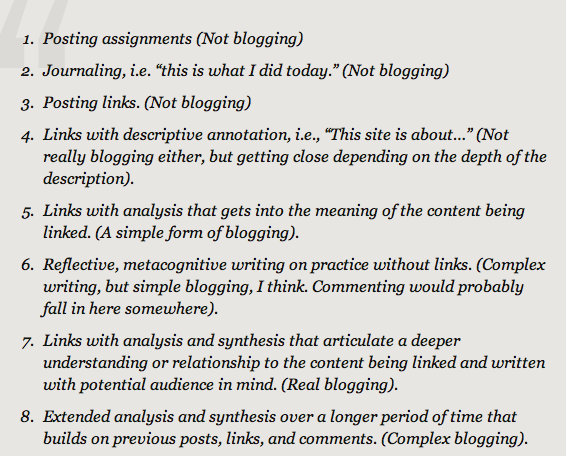It was with interest that I read Kim Cofino’s blog entry the other day entitled "Creating a Blogging Scope and Sequence". I think that the intent was to provide a sense of academic rigour in the process. This followed on a message that an Ontario Educator, @danikabarker, had sent out indicating that she was marking blog posts.
I’ve seen a number of rubric creations that people use to assess blogs and they do serve to remind me that I’m not a teacher of English! I do understand the need for an assessment if creating a blog or responding to blog posts are part of the criteria for a course. All of this follows, of course, on a little forth and back that I had with Jenny Luca about academic rigour in terms of references, etc., for blog creation.
All of this really is interesting – after all, blogging is something that we’ve contrived relatively recently as a reading, writing, and responding mechanism. So, it does make sense that there is an attempt to put a number or letter on things for classroom reporting. I recall a conversation that I had with an A&E person who indicated that "if it wasn’t assessed, it wasn’t taught". I really had difficulty with the logic because just it was "taught" doesn’t necessarily mean that it was "learned". But, it wasn’t the first time that I had disagreed with this person.
So, if we’re going to do some sort of assessment, I guess the question should be "what for?" I can see where there may be some who would consider this a culminating activity. Perhaps the actual "words to blog" action could be. If we see a blog as an area to develop and share concepts, and an ongoing process, I would hope that it’s more of a formative assessment with the goal of making the writer more reflective and to use the tools, along with reader feedback, as an ongoing area for improvement.
As more classrooms include blogging as an academic exercise, maybe it’s time to define just what it is we mean when we say "blog". In her post, Kim quotes from Will Richardson’s Blogs, Wikis, Podcast and Other Powerful Web Tools for the Classroom book on page 32.

Now, I have great respect for all of the folks that I’ve referenced above so I thought that maybe it would be interesting to evaluate my own blog. I was all set to go when another voice who I greatly respect, Stephen Downes, comments on Kim’s original post as "For the record, the things she says are not blogging, are blogging."
So, where does one start? I go back to my A&E resource who indicated once that "there need to be clearly defined targets" that students can aim for.
I don’t think that it’s going too far out on a limb that all of the above want to push bloggers towards #8 in the list above. As I reflect on this blog, I surely can see 2, 3, and 4 on a regular basis. In fact, it’s my goal that once a day I use this blog to share what I’m finding on the internet with the hope that it is of value to other. For the most part, I would suggest that my ramblings are 5 and 6. I guess that I just have to learn to live with the word "simple".
And yet, there is another side to all of this. It seems to me that the value of blogging is in the value that readers have to the blog itself. This manifests itself in a number of ways. There’s nothing like the thrill that comes when someone writes a reply or mentions the writing on Twitter encouraging others to read the content. From a quantitative perspective, the statistics that most blogging platforms provide real numbers as an indication of the value of the content. If the goal of blogging is to start or continue the discussion, shouldn’t the level of engagement that results be the ultimate assessment tool?
Powered by Qumana

Please share your thoughts here. I’d enjoy reading them.